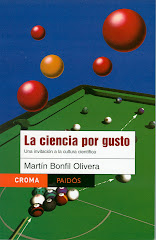by Martín Bonfil Olivera
Published on Milenio Diario, February 18, 2009
 A kind but pressing reader is worried because, by reading what several science writers, including me, have published about the ideas of Charles Darwin, and comparing it with what he wrote in his books On the origin of species and The descent of man, he finds discrepancies.
A kind but pressing reader is worried because, by reading what several science writers, including me, have published about the ideas of Charles Darwin, and comparing it with what he wrote in his books On the origin of species and The descent of man, he finds discrepancies.
He is concerned because some sentences from Darwin can be read to say that human beings are superior to other species, and that they descend from monkeys (which is of course wrong: man and money descend from the same ancestor, not from one another; moreover, species can be well or badly adapted to their environment, but there can be no talk of superiority in absolute terms).
Although
On the other hand, in the 150 years since the publication of The origin, knowledge has advanced a lot. The mechanism of inheritance, a key component of his theory of evolution by natural selection, was unknown. For lack of a better explanation, he proposed a hypothesis (pangenesis) to explain it; he was wrong. The correct mechanism —genes— was discovered by the monk Gregor Mendel around the same time Darwin was publishing his book, but it was forgotten and was not re-discovered until 1900.
Genetics was incorporated to Darwinian theory and gave rise to population genetics, and the modernization of evolutionary theory continued during the 30's and 40's up to the "modern synthesis" or synthetic theory of evolution.
Finding ideas that sound wrong in
(translated by Adrián Robles Benavides)
To receive Science for pleasure weekly
in your email, subscribe here!




No comments:
Post a Comment